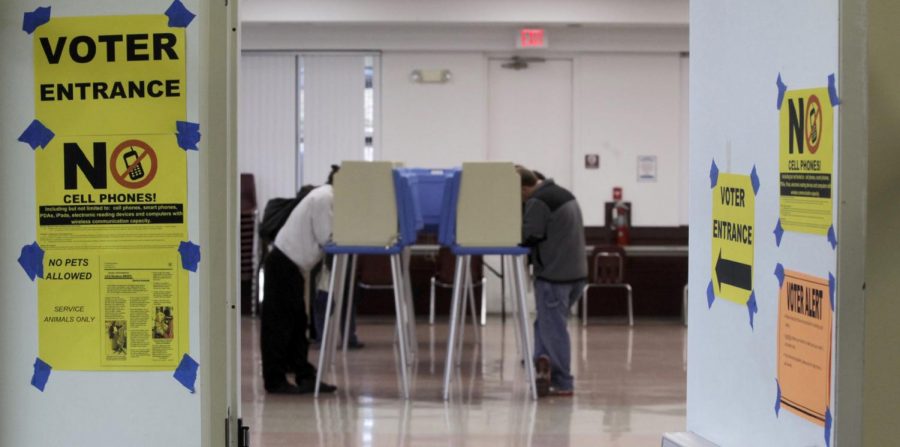The real culprits of voter ID laws
Photo courtesy of Tribune News Service
The entrance to vote at the Herbert Young Community Center polling place in Cary, N.C., on Nov. 6, 2012. The State and 13 congressional districts will remain in place and so will the Nov. 6 election, a federal three-judge panel ruled on Sept. 4.
December 13, 2018
Allegations of voter fraud made headlines last week as the results of the North Carolina 9th Congressional District election went to the district’s election board for review, inviting a debate on the effectiveness of current attempts to prevent such fraud.
Mark Harris, a Republican challenger to the seat, beat his Democratic rival, Dan McCready, by a meager 905 votes. What sparked intrigue, however, was that he disproportionately won vote-by-mail ballots in the district, indicating that some election tampering occurred. As claims of voter fraud begin to surface, it seems as though the episode is a darkly humorous bookend to this past midterm cycle, which began with fears of voter suppression in North Dakota as a result of strict voter ID laws.
The allegations in North Carolina are the worst nightmare of proponents of voter ID laws. It’s exactly what they hope to avoid by pushing the harsh rules. But those voter ID laws are not aimed at the usual culprits of voter fraud. Instead, they unfairly marginalize minority voters.
The person suspected of orchestrating the alleged fraud in North Carolina is Leslie McCrae Dowless, a political operative hired as an independent contractor by a political consulting group to run Harris’ campaign. Dowless has a history of using absentee ballots to the advantage of the campaigns he works on. In this race, Harris won 61 percent of mail-in ballots, despite the fact that Republicans made up only 19 percent of mail-in voters.
This episode relates closely to the debate in North Dakota earlier this fall, when proponents of strict voter ID laws saw a victory as the Supreme Court allowed a new statute to take effect for the 2018 election cycle. The law established that voters must have an ID that shows their name, birth date and residential address.
Get The Daily Illini in your inbox!
The new rule disproportionately affected the large Native American population in the state, a large percentage of whom use P.O. boxes or don’t have permanent addresses. After huge community outreach efforts and major activist organizing, Native American turnout actually increased from the previous midterm cycle. But the fact that it took so much effort and so many resources for that to happen indicates a trend of suppression that only hurts our electoral system.
Maintaining the integrity of American elections is of the utmost importance to our democracy, but voter ID laws are not an effective way of doing so. Experts agree that most voter fraud looks like what was seen in North Carolina — a concerted effort to defraud the voters and the election process, not individuals trying to vote twice.
Our voting laws should reflect this reality. What we can learn from the fraud claims in the North Carolina 9th is that mail-in ballots are one of the most vulnerable parts of our election system. This does not mean, however, that mail-in and absentee voting should be curtailed. It means that voters have to be incentivized to protect their votes.
For example, Dowless’ North Carolina operation involved a network of volunteers who would witness, seal and deliver voters’ ballots for them — illegal pursuant to North Carolina’s voting laws. But in “all-mail” states like Washington, every registered voter is mailed a ballot with free postage, ensuring that more people could vote than would have, and removing the possibility that something like what happened in North Carolina would occur there, because the promise of a delivery by stranger isn’t as alluring when postage is paid for and an envelope simply has to be dropped in the mailbox.
At the end of the day, it is important to note that the number of instances of mail-in voter fraud is very small compared to the millions of Americans who were successfully able to vote this past November. But it is clear that some rules should be in place to ensure that our elections are kept free and fair.
The rules we have now are insufficient. They make our elections a little less free the more difficult they make it to vote for the likes of Native Americans in North Dakota.
Kyra is a sophomore in LAS.







